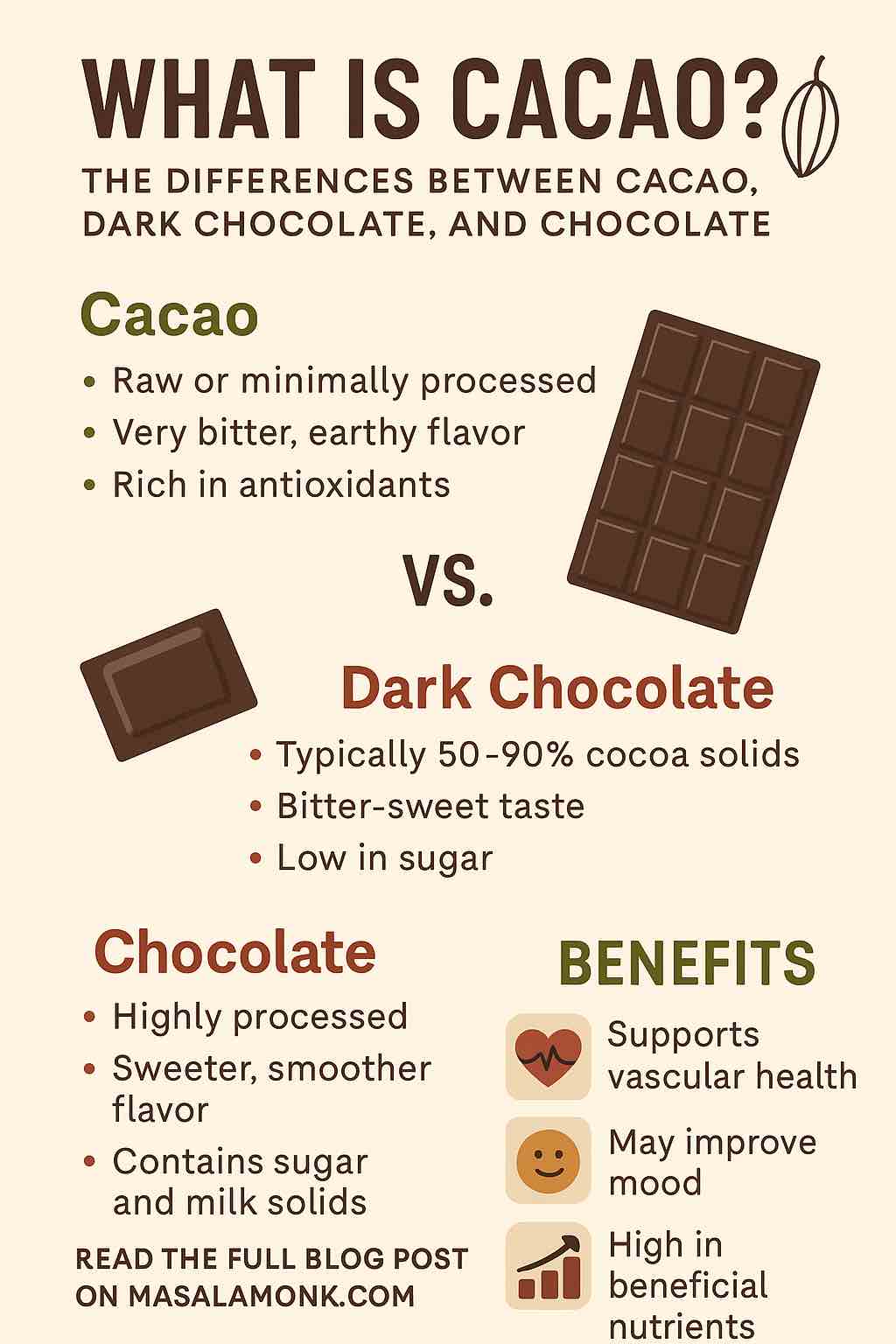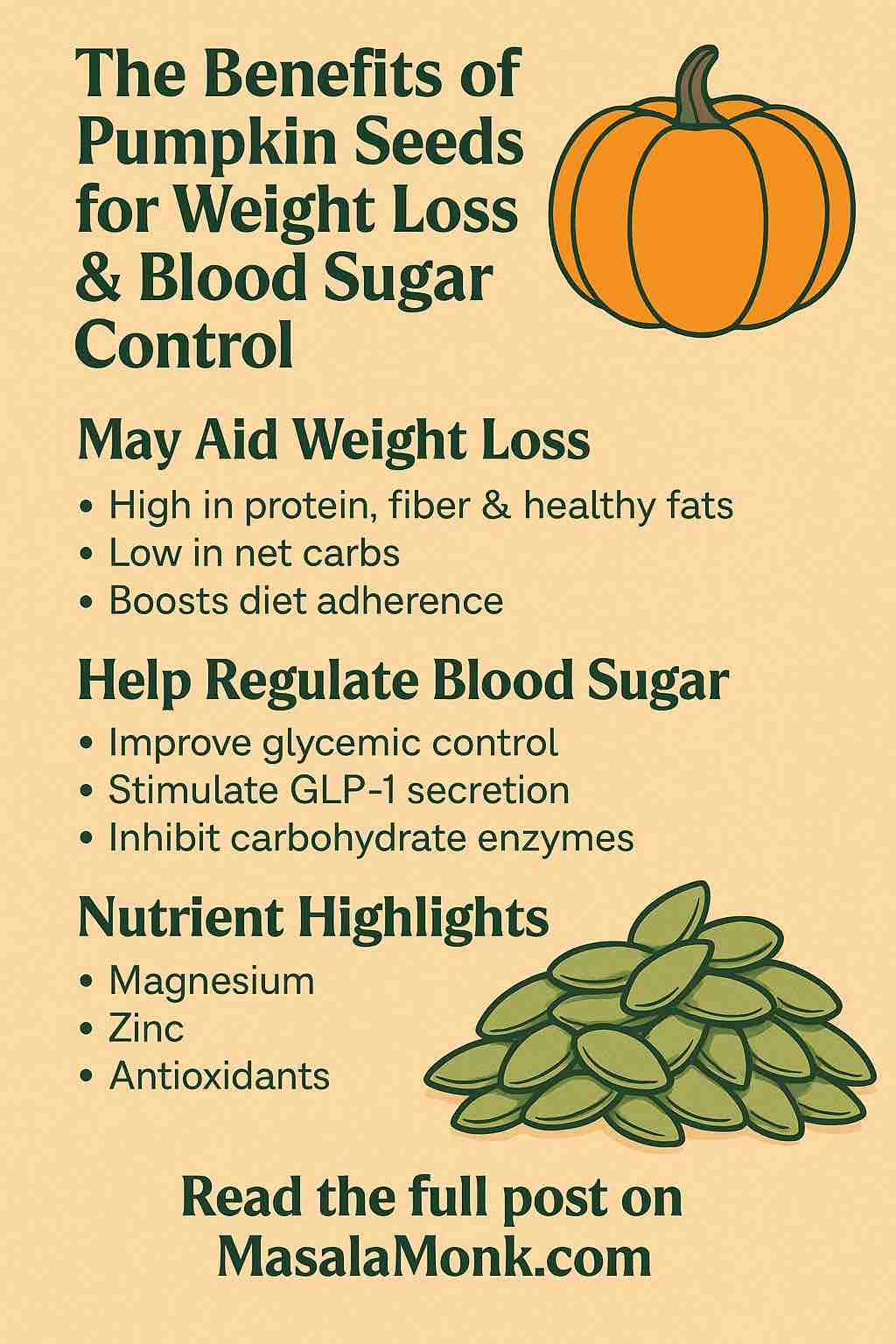
If you’ve ever stood in the chocolate aisle wondering what “raw cacao” is or whether dark chocolate is actually healthy—this guide is for you.
We’ll decode the differences between cacao, chocolate, and dark chocolate, explore the latest science on their health benefits, and help you make smarter, more delicious choices.
🌱 What Exactly Is Cacao?
Cacao is the raw, unprocessed form of chocolate.
It comes from the seeds of the Theobroma cacao tree—a tropical plant native to Central and South America whose name means “food of the gods.” These seeds (commonly called cacao beans) are fermented, dried, and sometimes gently roasted, depending on the intended product.
🍃 Types of Cacao Products:
- Cacao Nibs: Crushed cacao beans—crunchy, bitter, rich in antioxidants.
- Cacao Powder: Cold-pressed cacao beans with the fat (cacao butter) removed.
- Cacao Butter: The creamy fat extracted from the beans—used in both chocolate and cosmetics.
Unlike conventional cocoa, cacao is minimally processed, preserving much of its natural nutrient content.
🍫 Chocolate: A Delicious Evolution
Chocolate is what most people think of when they see candy bars or desserts. It’s a processed food made from cocoa (roasted cacao), cocoa butter, sugar, and often milk solids or emulsifiers.
There are three main types:
- Milk Chocolate – Contains milk powder, sugar, and 10–25% cocoa solids.
- Dark Chocolate – Contains 50–90% cocoa solids and little or no milk.
- White Chocolate – Contains cocoa butter, sugar, and milk solids—but no cocoa solids (so it’s technically not “chocolate” at all!).
🥊 Cacao vs. Chocolate vs. Dark Chocolate: What’s the Difference?
| Feature | Raw Cacao | Dark Chocolate | Regular Chocolate |
|---|---|---|---|
| Processing Level | Minimal or raw | Roasted, conched, tempered | Highly processed, more sugar/milk additives |
| Flavor Profile | Earthy, bitter, nutty | Bitter-sweet, complex | Sweet, creamy, less intense |
| Sugar Content | None | Low to moderate | High |
| Antioxidants | Highest (flavanols, polyphenols) | Medium–high depending on % | Low due to processing |
| Nutritional Value | Magnesium, iron, flavonoids, theobromine | Similar nutrients, reduced by heat/sugar | Mostly fats and sugar |
| Best Use | Smoothies, granola, raw desserts | Healthy indulgence, baking, snacking | Candy, sweets |
🧬 What the Science Says (2024–2025 Research Updates)
Recent studies reveal compelling health benefits of cacao and dark chocolate—when consumed wisely:
❤️ Cardiovascular Support
- Flavanols in cacao and high-quality dark chocolate improve blood flow, reduce blood pressure, and enhance arterial function.
- A May 2025 meta-analysis (University of Surrey) found cocoa flavanols as effective as some BP medications in supporting vascular health.
🧠 Brain Boost & Mood
- Theobromine and phenylethylamine (in cacao) stimulate the central nervous system, elevating mood and focus.
- Dark chocolate may trigger endorphin release and serotonin production, helping relieve stress.
💪 Antioxidant Power
- Raw cacao contains 40x more antioxidants than blueberries. Its ORAC score (oxygen radical absorbance capacity) is among the highest of any food.
⚖️ Weight & Blood Sugar
- In moderation, cacao and 70–90% dark chocolate can help regulate insulin, reduce appetite, and even improve lipid profiles (lower LDL).
⚠️ But Wait… What About Heavy Metals?
This part matters.
Recent lab tests (Consumer Reports, 2023–2024) found that 43% of dark chocolate bars tested exceeded California Prop 65 limits for lead, and 35% for cadmium—especially in brands using beans from Latin America.
Tips to reduce risk:
- Rotate brands (don’t eat the same bar daily).
- Favor companies who publish heavy metal testing (e.g., Alter Eco, Taza, Thrive Market).
- Limit daily intake (1 oz / 28g or less).
🥗 How to Use Cacao in Everyday Life (Practical Tips)
🥣 Morning Power Boost
- Add 1–2 tsp raw cacao powder to your smoothie, oatmeal, or yogurt for a flavonoid kick.
🍫 Smart Snacking
- Choose dark chocolate with ≥70% cocoa, minimal ingredients (avoid added oils, milk, or artificial flavors).
- Look for organic, fair trade, and ideally bean-to-bar products.
🧁 Bake Better
- Use natural cacao powder instead of Dutch-processed cocoa in baking to retain antioxidants.
- Try cacao nibs as a crunchy topping for muffins, pancakes, or trail mix.
🌍 Sustainable Chocolate: The Bigger Picture
Cacao farming can either degrade or regenerate the planet.
- Traditional cacao farming in West Africa is linked to deforestation, child labor, and soil depletion.
- Regenerative cacao (e.g., shade-grown, agroforestry methods) supports biodiversity, carbon capture, and farmer well-being.
Look for certifications like:
- Rainforest Alliance
- Fair Trade
- Direct Trade or Regenerative Organic Certified
Brands supporting ethical sourcing include:
- Tony’s Chocolonely
- Alter Eco
- Beyond Good
- Moka Origins
- Original Beans
🧠 TL;DR – The Smart Cacao Takeaways
✅ Raw cacao = superfood packed with minerals and antioxidants
✅ Dark chocolate (70–90%) = healthy treat, if low in sugar and heavy metals
❌ Milk chocolate = dessert, not health food
✅ Limit intake to 1 oz/day, rotate brands
✅ Choose organic, ethical chocolate for your health and the planet
🔎 Final Thought
Chocolate doesn’t have to be a guilty pleasure. With a little label reading and knowledge of how it’s made, you can enjoy cacao in its most powerful, pure form—or indulge in a quality dark chocolate bar that actually supports your health.
🙋♀️ FAQs: Cacao vs. Chocolate vs. Dark Chocolate
1. What’s the difference between cacao and cocoa?
Cacao refers to the raw or minimally processed beans of the Theobroma cacao tree, while cocoa is cacao that has been roasted—often at high temperatures, which reduces antioxidant content.
2. Is raw cacao healthier than dark chocolate?
Yes—raw cacao retains more antioxidants and nutrients because it isn’t exposed to high heat. However, high-quality dark chocolate (70% or more) still offers many health benefits.
3. What percentage of cocoa should I look for in dark chocolate?
Aim for at least 70% cocoa solids. The higher the percentage, the more flavonoids and less sugar you’ll get.
4. Can cacao help with mood and stress?
Yes. Cacao contains compounds like theobromine, phenylethylamine, and magnesium, which may boost mood, focus, and relaxation.
5. How much cacao or dark chocolate should I eat daily?
Moderation is key. Most studies suggest 1 oz (28g) per day of dark chocolate or 1–2 tsp of cacao powder.
6. What are the risks of heavy metals in chocolate?
Some dark chocolate products contain elevated levels of lead and cadmium, especially from certain regions. Rotate brands and look for those that test and disclose heavy metal levels.
7. Is white chocolate considered chocolate?
No. White chocolate contains cocoa butter but no cocoa solids, so it lacks the flavonoids and antioxidants found in dark or raw chocolate.
8. Can I use cacao powder in baking instead of cocoa powder?
Yes, but note that cacao powder has a stronger, more bitter taste and is more heat-sensitive. Use it in lower-heat recipes or add after cooking when possible.
9. Is chocolate vegan?
Raw cacao and many dark chocolates are naturally vegan, but always check the label for milk solids, whey, or butterfat in conventional products.
10. What’s the most sustainable kind of chocolate to buy?
Look for fair trade, organic, and regenerative cacao brands. Ethical chocolate supports environmental health and protects labor rights.










